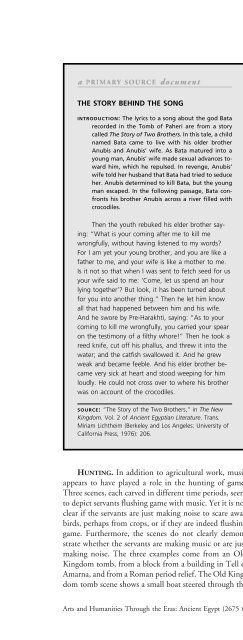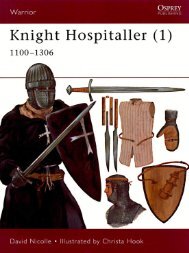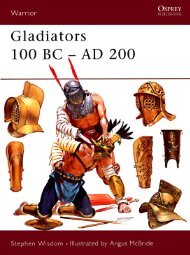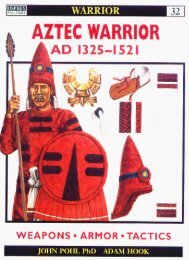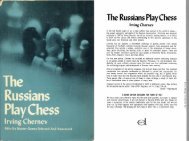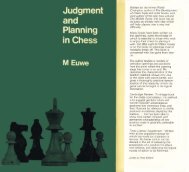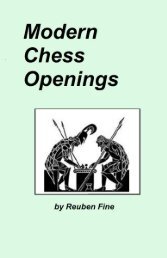Through the Eras
Edward Bleiberg ed., Ancient Egypt (2675-332 ... - The Fellowship
Edward Bleiberg ed., Ancient Egypt (2675-332 ... - The Fellowship
You also want an ePaper? Increase the reach of your titles
YUMPU automatically turns print PDFs into web optimized ePapers that Google loves.
MusicTHE STORY BEHIND THE SONGINTRODUCTION: The lyrics to a song about <strong>the</strong> god Batarecorded in <strong>the</strong> Tomb of Paheri are from a storycalled The Story of Two Bro<strong>the</strong>rs. In this tale, a childnamed Bata came to live with his older bro<strong>the</strong>rAnubis and Anubis’ wife. As Bata matured into ayoung man, Anubis’ wife made sexual advances towardhim, which he repulsed. In revenge, Anubis’wife told her husband that Bata had tried to seduceher. Anubis determined to kill Bata, but <strong>the</strong> youngman escaped. In <strong>the</strong> following passage, Bata confrontshis bro<strong>the</strong>r Anubis across a river filled withcrocodiles.Then <strong>the</strong> youth rebuked his elder bro<strong>the</strong>r saying:“What is your coming after me to kill mewrongfully, without having listened to my words?For I am yet your young bro<strong>the</strong>r, and you are like afa<strong>the</strong>r to me, and your wife is like a mo<strong>the</strong>r to me.Is it not so that when I was sent to fetch seed for usyour wife said to me: ‘Come, let us spend an hourlying toge<strong>the</strong>r’? But look, it has been turned aboutfor you into ano<strong>the</strong>r thing.” Then he let him knowall that had happened between him and his wife.And he swore by Pre-Harakhti, saying: “As to yourcoming to kill me wrongfully, you carried your spearon <strong>the</strong> testimony of a filthy whore!” Then he took areed knife, cut off his phallus, and threw it into <strong>the</strong>water; and <strong>the</strong> catfish swallowed it. And he grewweak and became feeble. And his elder bro<strong>the</strong>r becamevery sick at heart and stood weeping for himloudly. He could not cross over to where his bro<strong>the</strong>rwas on account of <strong>the</strong> crocodiles.SOURCE: “The Story of <strong>the</strong> Two Bro<strong>the</strong>rs,” in The NewKingdom. Vol. 2 of Ancient Egyptian Literature. Trans.Miriam Lich<strong>the</strong>im (Berkeley and Los Angeles: University ofCalifornia Press, 1976): 206.HUNTING. In addition to agricultural work, musicappears to have played a role in <strong>the</strong> hunting of game.Three scenes, each carved in different time periods, seemto depict servants flushing game with music. Yet it is notclear if <strong>the</strong> servants are just making noise to scare awaybirds, perhaps from crops, or if <strong>the</strong>y are indeed flushinggame. Fur<strong>the</strong>rmore, <strong>the</strong> scenes do not clearly demonstratewhe<strong>the</strong>r <strong>the</strong> servants are making music or are justmaking noise. The three examples come from an OldKingdom tomb, from a block from a building in Tell elAmarna, and from a Roman period relief. The Old Kingdomtomb scene shows a small boat steered through <strong>the</strong>SONGS FROM PAHERI’S TOMBINTRODUCTION: These songs were preserved in <strong>the</strong> tombof Paheri of El Kab. Ano<strong>the</strong>r partial copy of <strong>the</strong>sesongs is painted on <strong>the</strong> walls of <strong>the</strong> Tomb of Wensuin Thebes. Both of <strong>the</strong>se sites are in Upper Egypt. Itis difficult to determine whe<strong>the</strong>r <strong>the</strong>se songs spreadto o<strong>the</strong>r parts of Egypt, but it is significant that atleast some songs were repeated in different placesand at different times. This phenomenon suggestssome continuity in knowledge of Egyptian music.The Plowing SongWe do (it).Look! Do not fear for <strong>the</strong> fields! They are very good!How good is what you say, my boy!A good year is free from trouble.All <strong>the</strong> fields are healthy. The calves are <strong>the</strong> best!The Hoeing SongI shall do more than my work for <strong>the</strong> nobleman!My friend, hurry up with <strong>the</strong> work, and let us finishin good time.The Harvest SongA part song:This fine day goes forth on <strong>the</strong> Land.The nor<strong>the</strong>rn breeze has risen.The sky does our desire.Our work binds our desires.Translated by Edward Bleiberg.marsh by an oarsman and helmsman. Two o<strong>the</strong>r menstand in <strong>the</strong> boat. A boy holds two bird decoys with onehand while <strong>the</strong> o<strong>the</strong>r hand holds a tube on which <strong>the</strong>boy is blowing. Since not all of <strong>the</strong> tube is preserved, itis not possible to say for certain that it is a trumpet whosenoise or song would flush out <strong>the</strong> game in <strong>the</strong> marsh,but <strong>the</strong> presence of decoys certainly suggests huntinggiven evidence of <strong>the</strong>ir use in <strong>the</strong> New Kingdom. In <strong>the</strong>Amarna relief only one stone block is preserved. On <strong>the</strong>left side, a woman holds a tambourine. There is also <strong>the</strong>figure of a second woman and a boy with up-raised arms.On <strong>the</strong> right side is a tree with one bird ei<strong>the</strong>r alightingor flying off, startled by <strong>the</strong> tambourine. Again it isunclear whe<strong>the</strong>r <strong>the</strong>re is a connection with hunting,though <strong>the</strong> bird’s pose is similar to o<strong>the</strong>r New KingdomArts and Humanities <strong>Through</strong> <strong>the</strong> <strong>Eras</strong>: Ancient Egypt (2675 B.C.E.–332 B.C.E.) 163


